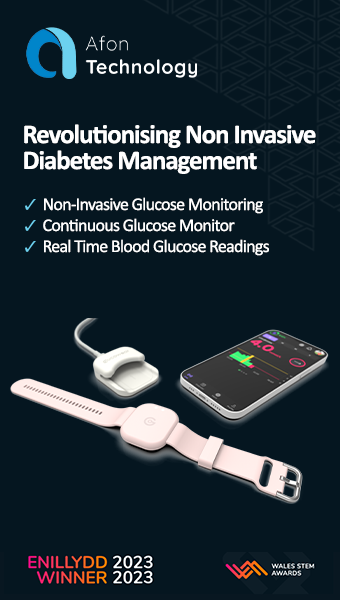An invited audience of members of the “heart community” in Wales has heard about pioneering research funded by the British Heart Foundation (BHF) which could lead to an injectable cure for inherited heart muscle conditions that can kill young people in the prime of their lives.
Addressing and audience of over 100 people at Techniquest in Cardiff Bay, Head of BHF Cymru, Rhodri Thomas said,
“These conditions are thought to affect as many as 13,000 people in Wales.1 Inherited heart muscle diseases can cause the heart to stop suddenly or cause progressive heart failure in young people.
“Every week in the UK, 12 people under the age of 35 die of an undiagnosed heart condition2, very often caused by one of these inherited heart muscle diseases, also known as genetic cardiomyopathies. Around half of all heart transplants are needed because of cardiomyopathy and current treatments do not prevent the condition from progressing.”
The charity’s Associate Medical Director, Professor James Leiper, explained that the ultimate goal is the production of a curative treatment after an international team of researchers were announced as the winners of the British Heart Foundation’s Big Beat Challenge. He said:
“This is a defining moment for cardiovascular medicine. Not only could CureHeart be the creators of the first cure for inherited heart muscle diseases by tackling killer genes that run through family trees, it could also usher in a new era of precision cardiology.
“If successful, the same gene editing innovations could be used to treat a whole range of common heart conditions where genetic faults play a major role. This would have a transformational impact and offer hope to the thousands of families worldwide affected by these devastating diseases.”
Families from across Wales, who have lost people to cardiomyopathies, heard the stories of Sioned Thomas, 25 from Caerleon, and Elis Power, 28, from Bridgend, whose fathers both died following cardiac arrests caused by undiagnosed cardiomyopathies.
Sioned started fundraising for BHF Cymru after her father Grahaeme, 51, died while they were on a run together in 2019. She says supporting the charity’s research by running helped her channel her grief:
“Hearing about this new research has made me feel really hopeful for the future and relieved to know that hopefully deaths caused by cardiomyopathy could be a thing of the past. It is really exciting to think that families could no longer be burdened by this disease, and I am looking forward to hearing more about the research as it progresses.”
Elis’ father Raymond was just 30 years old when he died after a cardiac arrest at work. Elis was only three years old, at the time and has since been diagnosed with the same condition which affected his father, hypertrophic cardiomyopathy (HCM). He volunteers as a Trustee for Cardiomyopathy UK and was part of the patient panel for the CureHeart project. He said:
“I’m so grateful for research funded by the BHF and being involved through Cardiomyopathy UK as part of the research team focussing on patient insight and making sure the views of people like me are heard as the research progresses. This means there may be a future with a cure for hereditary conditions like HCM.”
Consultant cardiologist Dr Carey Edwards and Inherited Cardiac Conditions (ICC) Nurse Specialist Sister Louise Norgrove also spoke at the event. They are based at Morriston Hospital and have worked closely with BHF Cymru for a number of years. In a role co-funded by the BHF and the Miles Frost Fund, Louise developed a pioneering service for screening families affected by inherited cardiac conditions across Swansea Bay and Hywel Dda Health Boards.
Louise said:
“This is excellent news for patients affected by cardiomyopathy and really does provide reassurance and hope for the future. The patients reviewed within the ICC service either have a diagnosis of a cardiomyopathy or are close relatives who are under long term cardiac surveillance due to the risk of the condition developing over time.
“Both groups have anxieties in regard to the genetic component of the condition so the news that a cure may be on the horizon due to the BHF CureHeart project has been received extremely well by this patient group. The newly established ICC service has had a far-reaching affect in regard to future planning for ICC services in Wales and as a team we have been keen to network with larger centres in order to learn from their experience.
“Earlier this year our ICC team visited Professor Watkins and his team at the John Radcliffe Hospital, Oxford. It was a privilege to meet the team involved in the CureHeart project. It really was inspiring and provides lots of hope to families affected by cardiomyopathy.”
Dr Edwards added:
“We have learned a lot about the genetics of inherited cardiomyopathies, but so far the use of genetic testing has been limited to identifying people at risk of developing the condition. CureHeart is an ambitious project and a step towards developing treatments that will prevent the condition from developing in young people at risk.”
The Big Beat Challenge Award – CureHeart
The global award, at £30m, is one of the largest non-commercial grants ever given and presents a “once in a generation opportunity” to provide hope for families struck by these killer diseases.
The winning team, CureHeart, will seek to develop the first cures for inherited heart muscle diseases by pioneering revolutionary and ultra-precise gene therapy technologies that could edit or silence the faulty genes that cause these deadly conditions.
The team, made up of world-leading scientists from the UK, US and Singapore, were selected by an International Advisory Panel chaired by Professor Sir Patrick Vallance, Chief Scientific Advisor to the UK Government.
It’s estimated that one in 250 people worldwide – around 260,000 people in the UK – are affected by genetic cardiomyopathies, with a 50:50 risk they will pass their faulty genes on to each of their children. In many cases, multiple members of the same family may develop heart failure, need a heart transplant, or are lost to sudden cardiac death at a young age.
BHF Professor Hugh Watkins, from the Radcliffe Department of Medicine at the University of Oxford and lead investigator of CureHeart, said:
“This is our once-in-generation opportunity to relieve families of the constant worry of sudden death, heart failure and potential need for a heart transplant. After 30 years of research, we have discovered many of the genes and specific genetic faults responsible for different cardiomyopathies, and how they work. We believe that we will have a gene therapy ready to start testing in clinical trials in the next five years.
“The £30 million from the BHF’s Big Beat Challenge will give us the platform to turbo-charge our progress in finding a cure so the next generation of children diagnosed with genetic cardiomyopathies can live long, happy and productive lives.”
Dr Charmaine Griffiths, Chief Executive of the British Heart Foundation, said:
“With the public’s support, the aim of the Big Beat Challenge was to move past incremental progress and make a giant leap in an important area of heart patient care. Creating the world’s first genetic cure for a heart disease would undoubtedly do this and has the potential to stop families losing loved ones without a moment’s notice to these cruel diseases. However, we need the continued backing of our supporters to turn science like this into a reality for the millions of people around the world living with heart disease.”
The team will take the revolutionary gene-editing technology of CRISPR to the next level by deploying ultra-precise techniques, called base and prime editing, in the heart for the first time. These ground-breaking approaches use ingenious molecules that act like tiny pencils to rewrite the single mutations that are buried within the DNA of heart cells in people with genetic cardiomyopathies.
They will focus this technology on two areas. First, where the faulty gene produces an abnormal protein in the pumping machinery of the heart, the team will aim to correct or silence the faulty gene by re-writing the single spelling mistakes or switching off the entire copy of the faulty gene.
Second, where the faulty gene does not produce enough protein for the heart muscle to work as it should, the team plan to increase the production of healthy heart muscle proteins by using genetic tools to correct the function of the faulty copy of the gene or to stimulate the normal copy of the gene.
The team have already proven that these approaches are successful in human cells. They believe the therapies could be delivered through an injection in the arm that would stop progression and potentially cure those already living with genetic cardiomyopathies. It could also be used to prevent the disease developing in family members who carry a faulty gene but have not yet developed the condition.
Sir Patrick Vallance, Chair of the BHF’s International Advisory Panel and Government Chief Scientific Adviser, said:
“CureHeart was selected in recognition of the boldness of its ambition, the scale of its potential benefit for patients with genetic heart muscle diseases and their families, and the excellence of the international team of participating researchers.”
LONG CASE STUDIES
PATIENT CASE STUDY: ELIS POWER
28-year-old Elis Power from Bridgend is a young man with a bright future. He’s successful in his career as a cyber security consultant and this May he married Jasmine, 25, at Bryngarw House in Bridgend.
The couple, who met at school, have so much to look forward to and are excited about planning their lives together. Elis lives an active life and looks fit and healthy, but has Hypertrophic Cardiomyopathy (HCM), a hidden heart condition he was born with.
The BHF estimates that more than 6,000 people in Wales have HCM and most are likely to be undiagnosed.
When a person has HCM, the muscular wall of their heart – the myocardium – becomes thickened which can make the heart muscle stiff. This can make it harder for their heart to pump blood around their body.
Many people with HCM feel fine and have little or no symptoms. Those who have symptoms find that they are managed well with treatment and they're able to have a good quality of life. However, some people have symptoms that get worse over time.
Abnormal heart rhythms, or arrhythmias, such as atrial fibrillation or heart block can happen as a result of having HCM. People with HCM might also be at risk of endocarditis, an infection of the heart’s inner lining. There is a rare risk of developing a life-threatening abnormal heart rhythm, which can cause a cardiac arrest and sudden death.
HCM was found to be in Elis’ family after his father Raymond passed away suddenly at work in 1997.
Even Elis’ mum, Ann Harrison-Power, a cardiac nurse, did not spot anything unusual about her husband before his death aged 30. Raymond played rugby and squash, had no idea he had the condition and had suffered no symptoms before he collapsed and died at work in Sony Pencoed.
Elis was only three years old at the time and has undergone rigorous screening ever since. He was diagnosed at age 22 when genetic testing revealed he had inherited the faulty gene. But long before that, worried doctors banned him from rugby and football, sports he loved, as a precautionary measure. Elis has tried to stay fit and active and live as full a life as possible. He takes care to eat the right foods, exercise as much as he can, cycling, five-a-side football, going to the gym and he drinks very little alcohol.
Elis became a Trustee for Cardiomyopathy UK, where he helped found the 14-25 Young People’s panel, volunteers as a community peer supporter, regularly fundraises, and helps run a support group for people living with the condition in Bridgend, which his mum Ann manages, and his wife Jasmine helps with.
After battling psychologically for many years with HCM, Elis now has an SICD, a subcutaneous (under the skin) implantable cardioverter defibrillator.
An ICD is a small device which can treat people with dangerously abnormal heart rhythms. It sends electrical pulses to regulate abnormal heart rhythms, especially those that could be dangerous and cause a cardiac arrest.
An SICD works in the same way as an ICD, but it's inserted under the skin of the chest (outside of the ribcage) and there are no leads placed into the heart.
Having this treatment has given Elis the confidence that he had lost after his diagnosis. Elis doesn’t let HCM get in the way of doing the things that he loves, and his doctors currently think it’s unlikely he could suffer the same catastrophic event as his dad, but the condition could worsen over time. Newly married Elis says that knowing he carries the gene which causes HCM is something he’s talked to his wife about.
Elis said:
“Jasmine is a little bit younger than me, so it’s not a big rush for us to start a family, but it’s certainly something we’ve discussed already with the NHS genetics team who support me. I’m aware that I could pass on the gene to my children, and we need to think about the different options available to us, screening through IVF etc, which would mean that we could ensure a child we had wouldn’t be born with the gene.
“But if Jasmine became pregnant and it wasn’t strictly planned, then we’d have the option of antenatal screening which would let us know whether there’s a chance that child would be born with the HCM gene. It’s a big decision, one that’s personal to us, but knowing that I carry a gene which could affect my future children is a huge responsibility.
“My condition has probably affected me more mentally than physically over the years, to be honest. Knowing that there is a potential cure for families like ours is amazing, and I’m delighted that the CureHeart project will offer hope to people like us and the generations to come.”
Elis is passionate about raising awareness of inherited heart conditions, saying:
“It is so important just being more conscious about it. If there is someone in your family who has had a sudden cardiac death, it could have been caused by a cardiomyopathy. Knowing about it is important because you can be proactive to get the treatment which could save your life.
Joel Rose, Chief Executive, Cardiomyopathy UK said:
“This is fantastic news for the cardiomyopathy community. The CureHeart project has the potential to transform the way we understand and treat genetic cardiomyopathies. We are really proud to be part of the team providing patient insight and can’t wait for the project to get started.”
FAMILY CASE STUDY: SIONED THOMAS
25-year-old Sioned Thomas from Caerleon was on a run with her father Grahaeme Thomas, 51, when he had a fatal cardiac arrest.
Sioned said:
“In June 2019 I was on holiday with my family in France and my dad decided to go for a run. He was fairly active, he played rugby when he was younger and regularly went running. At the last minute I decided to go with him and while we were out running my dad suddenly had a cardiac arrest. It happened so quickly; I just didn’t know what to do. It was so frightening.”
Since her father’s death, Sioned has been a passionate supporter of the BHF’s work, twice running the Cardiff Half Marathon, and raising almost £5,700 for the charity.
Sioned said:
“I took part in Cardiff Half to raise money for BHF’s research into inherited heart conditions. I’m not a natural runner but I wanted to do something for my dad and to help other families who are affected by heart diseases. Losing my dad was really hard for me and my family, and I was determined to fundraise in memory of my dad. It’s a fantastic thing to be a part of making a difference to the lives of people affected by heart conditions.”
Reacting to the announcement of the CureHeart research project, Sioned said:
“This really is amazing news and has the potential to change so many lives. With cardiomyopathy running in my family there’s even a possibility that this research could help save my life one day. I think there is currently a real lack of public awareness about heart diseases such as cardiomyopathy and the fact that they can impact anyone at any time.
“My family had no idea that my dad suffered from cardiomyopathy until it was too late, so raising awareness is something that is really important to me. I think it is really positive that the BHF are able to bring more attention to these issues and the amazing work they are doing to hopefully prevent families from experiencing loss like mine has.





